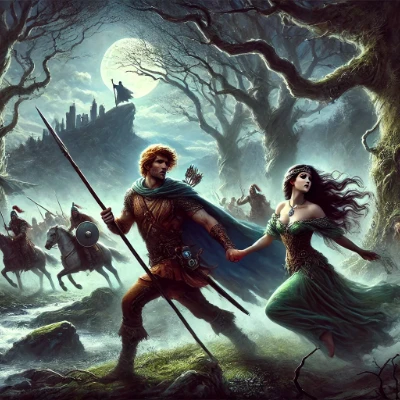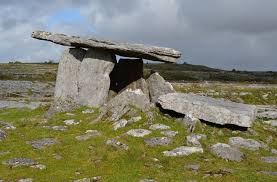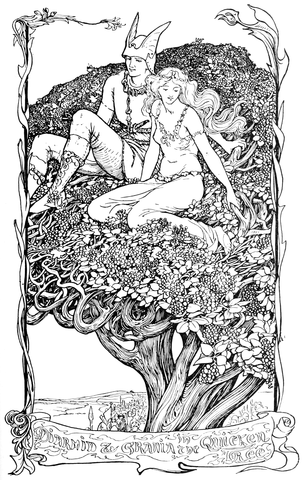The Tale of Diarmuid and Gráinne
Suppose you’ve ever been fascinated by tales of love, betrayal, and heroism. In that case, the story of Diarmuid and Gráinne from Irish mythology will capture your imagination. Their romance is part of the Fenian Cycle, a group of legendary tales featuring Fionn mac Cumhaill and his warriors, the Fianna. This myth has endured for centuries, leaving its mark on Ireland’s folklore, landscape, and literature. In this post, we’ll explore what makes Diarmuid and Gráinne’s story unforgettable.
Table of Contents
The Story of Diarmuid and Gráinne

To begin, imagine a grand feast in ancient Ireland. At the head of the table sits the legendary warrior Fionn mac Cumhaill, grey but still powerful. Across the hall is Gráinne, a High King’s daughter, meant to wed the much older Fionn.
Amidst the merriment, her eyes fall upon the young and handsome Diarmuid Ua Duibhne, and in that instant, everything changes. This moment sets the stage for one of Ireland’s most famous love stories—a tale of passion, duty, and destiny that has captured hearts for generations.
The Betrothal Feast: The Spark of Conflict
Gráinne, the beautiful daughter of Cormac mac Airt, the High King of Ireland, was betrothed to Fionn mac Cumhaill, the great leader of the Fianna. However, Fionn was already an older man by this time, and Gráinne was not in love with him.
At the grand feast celebrating their betrothal, she saw among the gathered warriors the handsome and youthful Diarmuid Ua Duibhne, one of Fionn’s most loyal warriors. Diarmuid was renowned for his bravery, his prowess in battle, and, most notably, a magical mark called the ball seirce (love spot) that made any woman who saw it fall deeply in love with him.
Overcome with desire, Gráinne realised she could not marry Fionn and instead wished to be with Diarmuid. She secretly prepared a sleeping potion, drugging all the guests at the banquet, except for Diarmuid. He refused when she approached him and begged him to take her away out of loyalty to Fionn. Enraged, Gráinne placed a geis (a binding magical obligation) upon him, which no warrior could refuse without facing disgrace. Under this compulsion, Diarmuid had no choice but to take Gráinne and flee.
In Irish mythology, a geis (pronounced roughly “gesh”) is a powerful binding spell or sacred obligation that compels a person to act or forbids them from doing something. Ignoring a geis can lead to terrible misfortune.
The Pursuit Across Ireland

As soon as Fionn awoke and discovered what had happened, he was furious and swore to hunt them down. He sent his warriors, including his son Oisín and the Fianna, to track them. However, Oisín, sympathetic to Diarmuid and Gráinne, secretly tried to warn them by bringing Fionn’s hounds close to their hiding places so that they could escape before being caught. Diarmuid ignores the warning and instead gives three kisses to Gráinne in full sight of an enraged Fionn.
Aonghus Óg, the god of love and Diarmuid’s foster father came to help them escape. He provided Gráinne with a cloak of protection and used his magic to aid their escape from the hunting party.
Diarmuid and Gráinne spent years on the run, travelling across Ireland. They survived by staying in the wilderness, often sleeping under the shelter of trees and making homes in caves. At one point, Diarmuid caught a fish in the river Luane and decided to spend the night. Soon after, they encountered a warrior named Muadhan, who would become their loyal companion and guide them on their journey.
The Mercenaries from the Channel Isles
Fionn was relentless in his pursuit. He eventually hired a band of mercenaries from the Channel Isles, a force of 1,000 men, and three poisonous hounds to hunt Diarmuid and Gráinne down. When Diarmuid and Gráinne encountered the mercenaries, the mercenaries did not know it was their prey. Diarmuid challenged the mercenaries to a game of skill where they were tested by running down a hill on barrels; they would leap onto the point of a spear and walk on the edge of a sword.
Many of the mercenaries died during this test, and then they finally saw Diarmuid for who he was. When they realised this, they set their hounds on him. He managed to defeat the hounds with the aid of Muadhán, and they killed the remaining mercenaries. Soon after, Muadhán parted ways with Diarmuid and Gráinne.
Moving on, Diarmuid and Gráinne crossed over a stream, where cold water splashed Gráinne on her leg, making her remark to Diarmuid that the stream was far bolder than he. It was then that they became lovers.
Encounter with Searbhán the Ogre

Coming to a forest, they came across a glen of fruit trees owned by a great ogre named Searbhán. They asked this ogre if they could take refuge on his land and stay a while. The ogre agreed they could stay as long as they did not touch any fruit on his trees.
During the stay, Gráinne realised she was pregnant. Due to her pregnancy, Gráinne began to crave fruit, so she asked Diarmuid to take some from the nearby trees. Knowing he had agreed with the ogre to stay as long as they didn’t touch the fruit, Diarmuid was hesitant.
But when Gráinne insisted on having them, Diarmuid had no choice but to confront the ogre. A fierce battle followed, and Diarmuid was ultimately victorious, killing Searbhán and bringing the berries back to Gráinne.
Hunted Down
Fionn, with the help of his trackers, eventually found the couple while they were staying in the Ogres Glen. Both Gráinne and Diarmuid hid among the bows of the trees as Fionn’s hounds searched for their scent.
Again, Diarmuid’s foster father, Aoughus, came to their rescue and secretly spirited them away under a cloak of concealment.
Despite this victory, they knew they could not keep running forever. Eventually, Aonghus Óg intervened and brokered a deal between Fionn and the High King, persuading Fionn to let Diarmuid and Gráinne live in peace.
The fugitive couple was allowed to return to Diarmuid’s native territory of West Kerry. Fionn and the high king granted land to the couple, and they lived happily for a long time, having more children.
The Great Hunt and Diarmuid’s Tragic Death
For a time, Diarmuid and Gráinne lived peacefully. However, Fionn had never truly forgiven Diarmuid for stealing his bride. Years later, he organised a great boar hunt in Ben Bulben (in present-day County Sligo) and invited Diarmuid to join.
As a child, it had been foreseen that Diarmuid would die while hunting the great boar of Beann Ghulban. Fionn knew this, and he knew Diarmuid could not turn down the offer of a hunt.
Aonghus Óg warned Diarmuid not to go, as he had foreseen danger. But Diarmuid, bound by his warrior’s code, could not refuse. During the hunt, a massive enchanted boar, which had once been Diarmuid’s own foster brother transformed by a curse, attacked him. Though he fought bravely and managed to slay the beast, he was fatally gored in the process.
As Diarmuid lay dying, Fionn had the power to save him—by giving him water from his hands, which had the ability to heal any wound. But, out of jealousy and spite, Fionn let the water slip through his fingers twice. His son Oisín and the other Fianna begged him to show mercy, and on the third attempt, Fionn relented. However, it was too late by then—Diarmuid had already died.
Aonghus Óg, heartbroken, took Diarmuid’s body and brought it back to his home in the Otherworld, promising that he would keep his spirit safe.
Legacy of Diarmuid and Gráinne
Gráinne was devastated by Diarmuid’s death, and the end of her story is unclear. Some say she returned to her father’s court, while others say she raised her children alone, never forgiving Fionn for his betrayal.
The tale of Diarmuid and Gráinne is one of love, betrayal, and tragedy, capturing the essence of Ireland’s heroic and romantic traditions. Their story has left a lasting mark on Irish folklore, and many places across Ireland are still named after them, recalling their legendary journey.
Themes and Lessons
Love vs. Duty
The story hinges on Diarmuid’s struggle between loyalty to his leader and his inescapable bond with Gráinne. The painful choice he makes underlines how love can clash with duty.
The Power of the Geis
The geis is a uniquely Irish concept that shows how fate and personal obligation are deeply intertwined. Diarmuid’s sense of honour forces him to submit to Gráinne’s will, altering their destinies.
The Tragic Triangle
Diarmuid and Gráinne’s tale is a tragic love triangle like Tristan and Iseult in other Celtic traditions. It highlights the timeless tension between passion, power, and obligation.
Mortality and Heroism
Despite Diarmuid’s strength, he cannot escape his foretold death. The ending reminds us that even the mightiest heroes must bow to destiny.
Cultural and Modern Impact
The story of Diarmuid and Gráinne lives on in Irish folklore and has inspired countless poems, ballads, and adaptations. Across Ireland, places are named after the lovers’ hiding spots, turning their legend into a form of historical tapestry woven into the landscape.
Modern authors and playwrights continue to find inspiration in this tale, exploring the complexities of love, power, and destiny. Tourists and locals alike can follow the couple’s supposed route, discovering secluded glens and ancient caves said to have sheltered them. It’s a reminder of how myth and reality often blend, especially in a land as rich in storytelling as Ireland.
Conclusion
The story of Diarmuid and Gráinne remains one of the most famous tales from Ireland’s Fenian Cycle. It captures the imagination with its blend of romance, adventure, and tragedy. It speaks to universal themes—love challenged by duty, the fragility of life, and the enduring power of myth. Even centuries later, their story resonates with anyone who has faced a difficult choice between following their heart or their obligations.
If you’d like to delve deeper into this legend, many translations and modern retellings are worth exploring. Or, if you’re feeling adventurous, why not visit some of the enchanting Irish locations said to have played a part in their journey? In the end, Diarmuid and Gráinne’s tale reminds us that no matter how grand our heroes, fate and love hold sway over even the greatest among us.
Book Recommendations:
- Gods and Fighting Men by Lady Augusta Gregory (1904)
- Early Irish Myths and Sagas, translated by Jeffery Gantz (Penguin Classics)
- A Dictionary of Celtic Mythology by James MacKillop (Oxford University Press)
